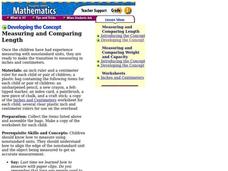Curated OER
Units of Measure
In this units of measure worksheet, students convert inches to feet. Students complete 10 problems where they convert inches to feet.
State of Michigan
Pre-K Mathematics
Kick-start children's education with this pre-school math unit. Offering 31 different hands-on learning activities that develop young mathematicians' pattern and shape recognition, basic number sense, and much more, this is a...
Curated OER
Measurement: Lesson 3
Eighth graders investigate the concepts that are related to measurement while focusing upon weight, mass, and capacity. They estimate the weight and mass relationship that is found in different problems. Students compare and contrast one...
Alabama Learning Exchange
Cosmic Measurements
Students develop two units of measurement to relate to the astronomical unit and the light year. In this astronomy instructional activity, students use a Twizzler to develop a measurement unit similar to the astronomical unit. They use a...
Curated OER
French Fry Fun: Estimating and Measuring
Third graders demonstrate their estimating and measuring abilities. In this length measurement lesson, 3rd graders produce estimates of how long a handful of French fries will be before physically measuring them. Students...
Curated OER
Measuring and Comparing Length
First graders use rulers to measure in both standard notation and centimeters. In this measuring lesson, 1st graders discuss the importance of a measuring standard. Students measure in inches and centimeters. Students compare inches to...
Curated OER
Internet Measurement
Students become familiar with how to get information from the Internet. In this math and technology lesson plan, students measure objects on a measurement sheet found on a web site. They practice using a standard unit of measurement...
Curated OER
Mathematics at the Frontier of Astronomy
Students explore the different types of measurements used in astronomy. For this space science lesson, students explain the relationship between planets' orbits and distance from the sun using Kepler's Laws. They discuss how math aides...
Curated OER
New York State Testing Program: Mathematics Test Book 1
In this mathematics test bookelt, students solve problems studied during the year. They solve problems covering topics such as probability, angle intersection, commission, percent, exponents, similar figures, and reading and...
Curated OER
Leaf Weight-Loss Plan
Pupils measure the weight of a container of leaves daily to discover how quickly it grows lighter as the foliage dries.
Curated OER
Explore the Mathematics of the Explorers
Columbus and other explorers relied upon mathematical calculations using the Earth, stars, and ships speeds.
Curated OER
Measure Exactly 8 Liters of Water
In this measure exactly 8 liters of water activity, 6th graders read the problem and solve the question of measuring 8 liters with only a 6 liter and an 11 liter bucket.
Noyce Foundation
Which is Bigger?
To take the longest path, go around—or was that go over? Class members measure scale drawings of a cylindrical vase to find the height and diameter. They calculate the actual height and circumference and determine which is larger.
Laboratory for Atmospheric and Space Physics
Growing Up With A Mission
New Horizons began its journey to Pluto in 2006. Ten years later, it continues its mission. In that time, scholars have surely grown, but how much more will they grow by the time New Horizons reaches its destination? Find out with an...
EngageNY
Getting the Job Done—Speed, Work, and Measurement Units II
How fast is your class? Learners determine the amount of time it takes individuals to walk a given distance and calculate their speeds. Pupils solve distance, rate, and time problems using the formula and pay attention to the...
Curated OER
Math Games for Skills and Concepts
A 27-page packet full of math games and activities builds on algebra, measurement, geometry, fractional, and graphing skills. Young mathematicians participate in math games collaboratively, promoting teamwork and skills practice.
Teach Engineering
What is a Nanometer?
Teams learn about the size of a nanometer by measuring objects and converting those measurements. A worksheet then tests the groups' abilities to use nanometers by having them determine the size of objects that are too small to...
Balanced Assessment
Curvy-Ness
Curves ahead! Develop a numerical measurement of curvy-ness. The class is challenged to come up with a definition of curvy that can be applied to curves. The class members use their defined measurement to describe a curve.
Illustrative Mathematics
Growing Bean Plants (Grade 2)
After planting a bean seed in a jar, young scientists observe the growth patterns over several days. As the bean becomes a sprout, and the sprout becomes a plant, partners measure and plot the data. They notice patterns, practice...
Shodor Education Foundation
Measures
Take a look at data from a statistical lens. An interactive allows pupils to enter data set, labeling the data including the units used. Manipulating the applet, learners select the statistics to calculate that include total, mean,...
Illustrative Mathematics
Running Around a Track I
The accuracy required by the design and measurement of an Olympic running track will surprise track stars and couch potatoes alike. Given a short introduction, the class then scaffolds into a detailed analysis of the exact nature of the...
Balanced Assessment
Gligs and Crocs
Explore relationships between perimeter and area. Learners compare the measurement units of gligs and crocs. They use a given perimeter and area as well as specific measurement relationships to determine the scale of gligs to crocs.
Illustrative Mathematics
Paper Clip
With minimal setup and maximum freedom, young geometers are encouraged to think outside the box on a seemingly simple application problem. Though the task seems simple, measuring a given paper clip and finding how many 10 meters can...
Everyday Mathematics
Mathematics Within: Slope and Triangles
Learners discover a method for determining the slope of a line by creating and comparing similar triangles. They fold coordinate grids to make three similar triangles then measure the sides to compare the relationships between the...























